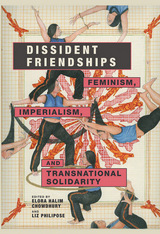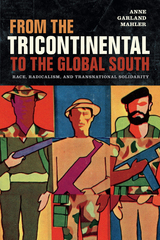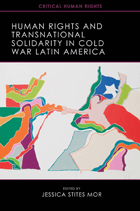4 books about Transnational Solidarity

Dissident Friendships
Feminism, Imperialism, and Transnational Solidarity
Edited by Elora Halim Chowdhury and Liz Philipose
University of Illinois Press, 2016
Often perceived as unbridgeable, the boundaries that divide humanity from itself--whether national, gender, racial, political, or imperial--are rearticulated through friendship. Elora Halim Chowdhury and Liz Philipose edit a collection of essays that express the different ways women forge hospitality in deference to or defiance of the structures meant to keep them apart. Emerging out of postcolonial theory, the works discuss instances when the authors have negotiated friendship's complicated, conflicted, and contradictory terrain; offer fresh perspectives on feminists' invested, reluctant, and selective uses of the nation; reflect on how the arts contribute to conversations about feminism, dissent, resistance, and solidarity; and unpack the details of transnational dissident friendships. Contributors: Lori E. Amy, Azza Basarudin, Himika Bhattacharya, Kabita Chakma, Elora Halim Chowdhury, Laurie R. Cohen, Esha Niyogi De, Eglantina Gjermeni, Glen Hill, Alka Kurian, Meredith Madden, Angie Mejia, Chandra T. Mohanty, A. Wendy Nastasi, Nicole Nguyen, Liz Philipose, Anya Stanger, Shreerekha Subramanian, and Yuanfang Dai.
[more]

From the Tricontinental to the Global South
Race, Radicalism, and Transnational Solidarity
Anne Garland Mahler
Duke University Press, 2018
In From the Tricontinental to the Global South Anne Garland Mahler traces the history and intellectual legacy of the understudied global justice movement called the Tricontinental—an alliance of liberation struggles from eighty-two countries, founded in Havana in 1966. Focusing on racial violence and inequality, the Tricontinental's critique of global capitalist exploitation has influenced historical radical thought, contemporary social movements such as the World Social Forum and Black Lives Matter, and a Global South political imaginary. The movement's discourse, which circulated in four languages, also found its way into radical artistic practices, like Cuban revolutionary film and Nuyorican literature. While recent social movements have revived Tricontinentalism's ideologies and aesthetics, they have largely abandoned its roots in black internationalism and its contribution to a global struggle for racial justice. In response to this fractured appropriation of Tricontinentalism, Mahler ultimately argues that a renewed engagement with black internationalist thought could be vital to the future of transnational political resistance.
[more]

Human Rights and Transnational Solidarity in Cold War Latin America
Edited by Jessica Stites Mor
University of Wisconsin Press, 2013
With the end of the global Cold War, the struggle for human rights has emerged as one of the most controversial forces of change in Latin America. Many observers seek the foundations of that movement in notions of rights and models of democratic institutions that originated in the global North. Challenging that view, this volume argues that Latin American community organizers, intellectuals, novelists, priests, students, artists, urban pobladores, refugees, migrants, and common people have contributed significantly to new visions of political community and participatory democracy. These local actors built an alternative transnational solidarity from below with significant participation of the socially excluded and activists in the global South.
Edited by Jessica Stites Mor, this book offers fine-grained case studies that show how Latin America’s re-emerging Left transformed the struggles against dictatorship and repression of the Cold War into the language of anti-colonialism, socioeconomic rights, and identity.
Edited by Jessica Stites Mor, this book offers fine-grained case studies that show how Latin America’s re-emerging Left transformed the struggles against dictatorship and repression of the Cold War into the language of anti-colonialism, socioeconomic rights, and identity.
[more]

Third Worlds Within
Multiethnic Movements and Transnational Solidarity
Daniel Widener
Duke University Press, 2024
In Third Worlds Within, Daniel Widener expands conceptions of the struggle for racial justice by reframing antiracist movements in the United States in a broader internationalist context. For Widener, antiracist struggles at home are connected to and profoundly shaped by similar struggles abroad. Drawing from an expansive historical archive and his own activist and family history, Widener explores the links between local and global struggles throughout the twentieth and twenty-first centuries. He uncovers what connects seemingly disparate groups like Japanese American and Black communities in Southern California or American folk musicians and revolutionary movements in Asia. He also centers the expansive vision of global Indigenous movements, the challenges of Black/Brown solidarity, and the influence of East Asian organizing on the US Third World Left. In the process, Widener reveals how the fight against racism unfolds both locally and globally and creates new forms of solidarity. Highlighting the key strategic role played by US communities of color in efforts to defeat the conjoined forces of capitalism, racism, and imperialism, Widener produces a new understanding of history that informs contemporary social struggle.
[more]
READERS
Browse our collection.
PUBLISHERS
See BiblioVault's publisher services.
STUDENT SERVICES
Files for college accessibility offices.
UChicago Accessibility Resources
home | accessibility | search | about | contact us
BiblioVault ® 2001 - 2024
The University of Chicago Press









